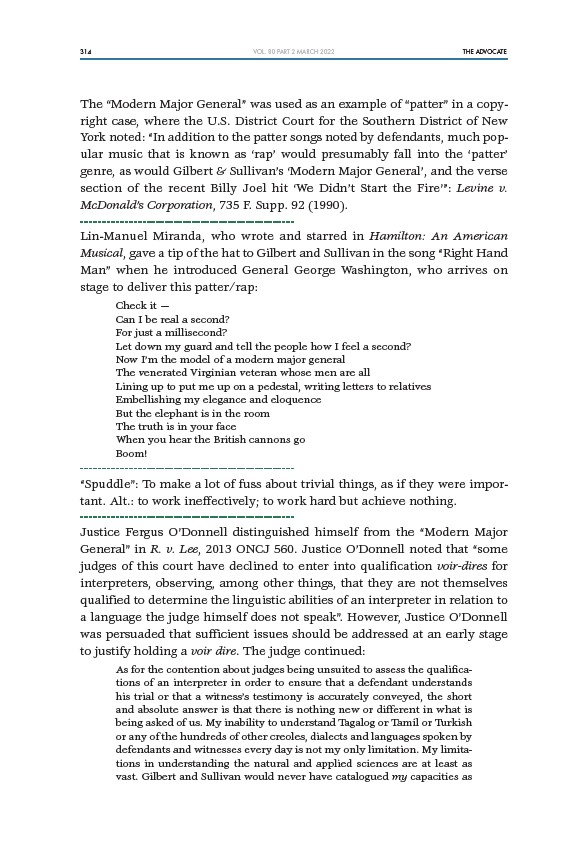
314 THE ADVOCATE
VOL. 80 PART 2 MARCH 2022
The “Modern Major General” was used as an example of “patter” in a copyright
case, where the U.S. District Court for the Southern District of New
York noted: “In addition to the patter songs noted by defendants, much popular
music that is known as ‘rap’ would presumably fall into the ‘patter’
genre, as would Gilbert & Sullivan’s ‘Modern Major General’, and the verse
section of the recent Billy Joel hit ‘We Didn’t Start the Fire’”: Levine v.
McDonald’s Corporation, 735 F. Supp. 92 (1990).
Lin-Manuel Miranda, who wrote and starred in Hamilton: An American
Musical, gave a tip of the hat to Gilbert and Sullivan in the song “Right Hand
Man” when he introduced General George Washington, who arrives on
stage to deliver this patter/rap:
Check it —
Can I be real a second?
For just a millisecond?
Let down my guard and tell the people how I feel a second?
Now I’m the model of a modern major general
The venerated Virginian veteran whose men are all
Lining up to put me up on a pedestal, writing letters to relatives
Embellishing my elegance and eloquence
But the elephant is in the room
The truth is in your face
When you hear the British cannons go
Boom!
“Spuddle”: To make a lot of fuss about trivial things, as if they were important.
Alt.: to work ineffectively; to work hard but achieve nothing.
Justice Fergus O’Donnell distinguished himself from the “Modern Major
General” in R. v. Lee, 2013 ONCJ 560. Justice O’Donnell noted that “some
judges of this court have declined to enter into qualification voir-dires for
interpreters, observing, among other things, that they are not themselves
qualified to determine the linguistic abilities of an interpreter in relation to
a language the judge himself does not speak”. However, Justice O’Donnell
was persuaded that sufficient issues should be addressed at an early stage
to justify holding a voir dire. The judge continued:
As for the contention about judges being unsuited to assess the qualifications
of an interpreter in order to ensure that a defendant understands
his trial or that a witness’s testimony is accurately conveyed, the short
and absolute answer is that there is nothing new or different in what is
being asked of us. My inability to understand Tagalog or Tamil or Turkish
or any of the hundreds of other creoles, dialects and languages spoken by
defendants and witnesses every day is not my only limitation. My limitations
in understanding the natural and applied sciences are at least as
vast. Gilbert and Sullivan would never have catalogued my capacities as